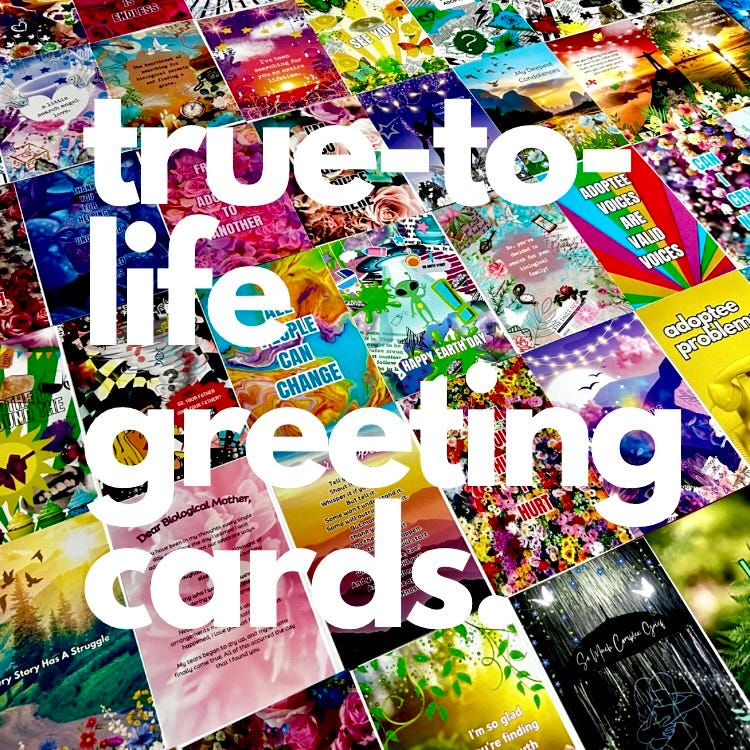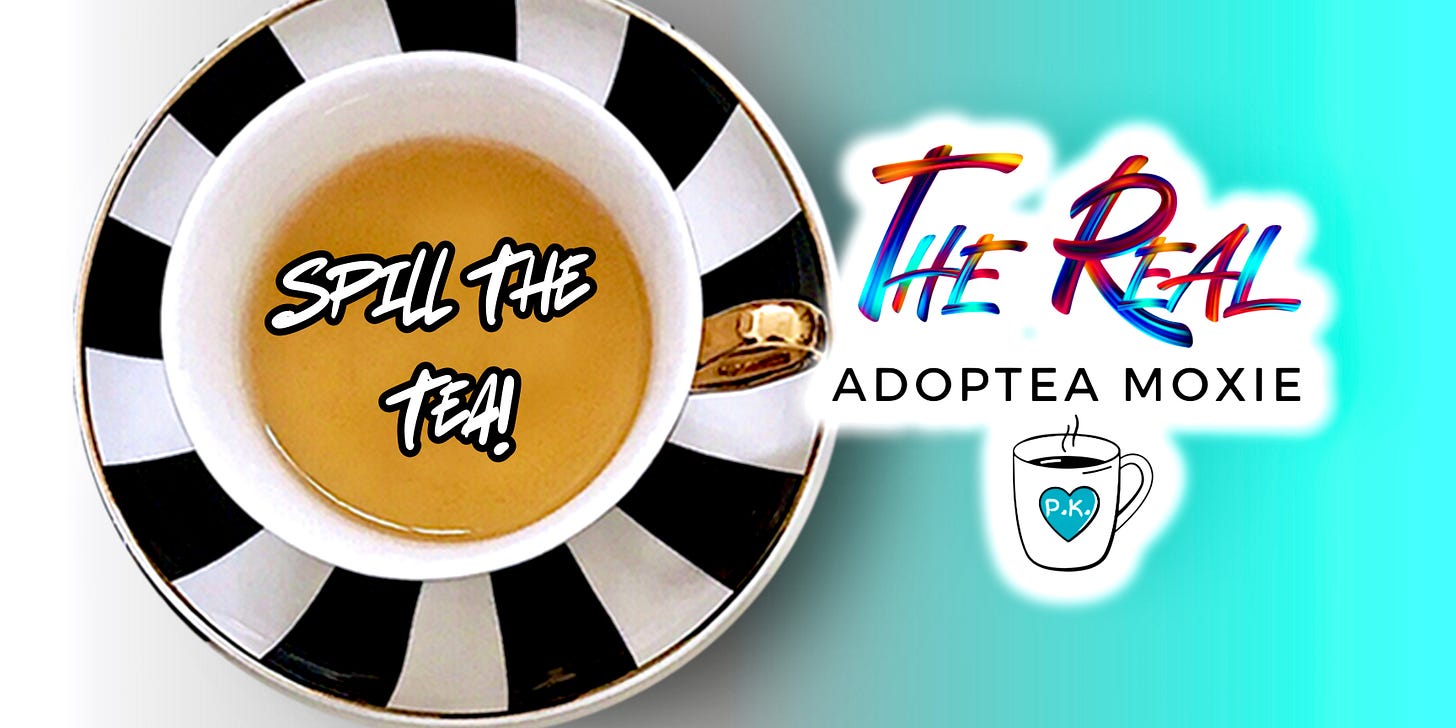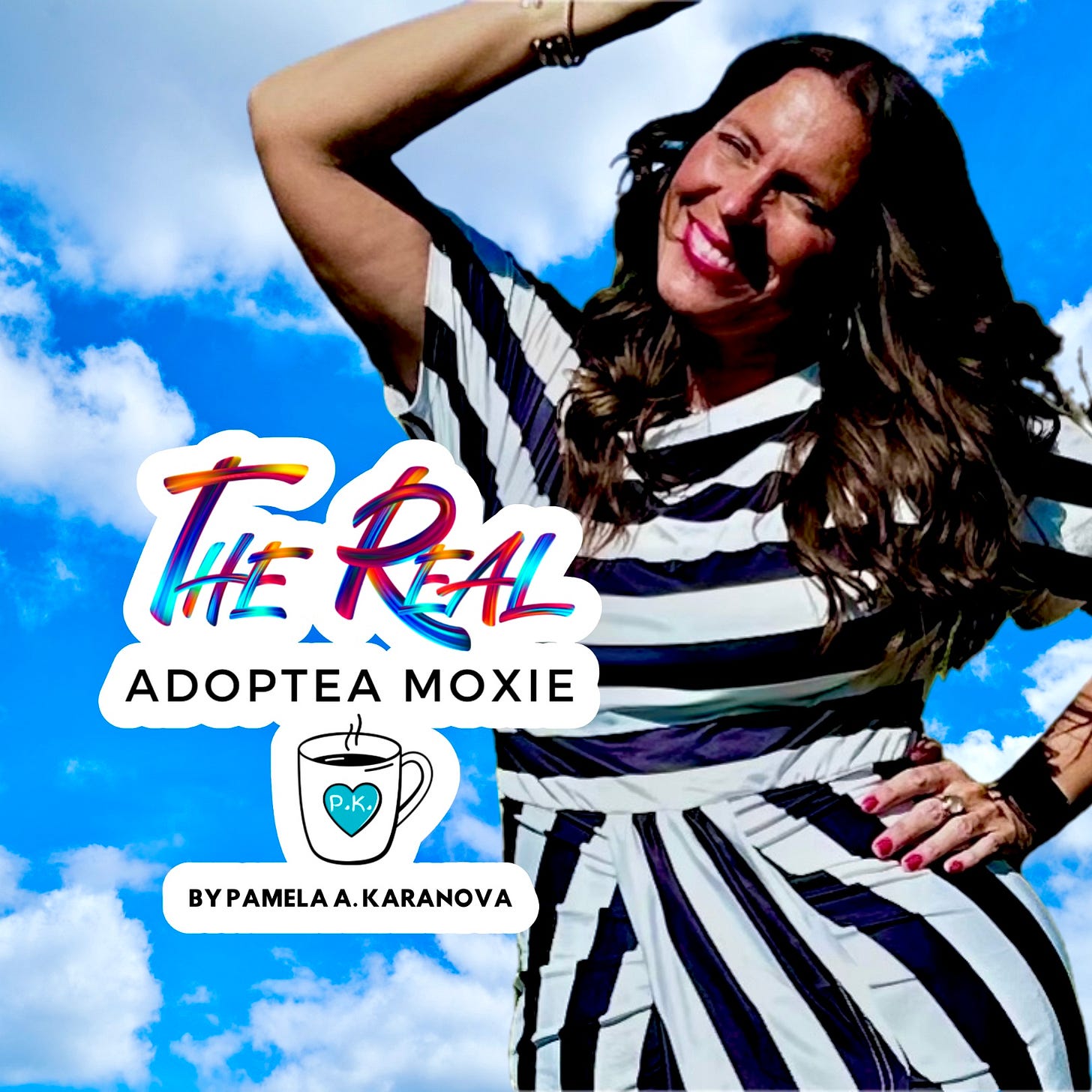Home for the Holidays? Why Adoptees Need Grace, Space, and Understanding During the Hardest Season
If an adoptee in your life declines an invitation or steps back from holiday traditions, it's essential to understand that it's not about you.

The holiday season is often depicted as a time of joy, connection, and celebration—a chance to gather with family and revel in cherished traditions. But for many adoptees, this time of year is profoundly complex, stirring up deep wounds that often remain unseen by those around us, but they can often feel them in us. What may seem like simple family gatherings to others can be harrowing for adoptees, bringing to the surface feelings of loss, rejection, and a longing for connection that runs painfully deep.
Why Holidays Are Especially Hard for Adoptees
The holidays, with their focus on family, togetherness, and belonging, often highlight the very things that many adoptees feel are missing or fractured in their lives. For some, the absence of biological family is a painful reminder of a history they can never fully know or reclaim. For others, complicated or even abusive adoptive family dynamics make the concept of "home for the holidays" far from comforting.
And then there are adoptees who, after reconnecting with their biological families, face rejection once again. The pain of this double loss cuts deep, and during a season that celebrates unity and kinship, the sense of exclusion can feel almost unbearable. Seeing others surrounded by loving families may unintentionally amplify an adoptee's grief, making the holiday season a time of emotional exhaustion rather than celebration.
A Message to Friends and Family: It's Not About You
If an adoptee in your life declines an invitation or steps back from holiday traditions, it's essential to understand that it's not about you. Well, sometimes it might be about certain family members, but I will leave that topic for another day! lol It's about the deeply personal and often complex emotions they are navigating. Their choice to prioritize self-care is a brave and necessary step, not a reflection of their love for you.
Instead of questioning or pushing, offer grace. A simple "I understand, and I'm here if you need me" can mean the world. Avoid taking their boundaries personally, and know that your patience and support can help them feel less alone.
Greeting Cards for Graceful Declines
For adoptees, saying "no" to holiday invitations can feel overwhelming, especially when family members don't fully understand the weight of what they're carrying. To make this process easier, I've created a set of greeting cards designed to decline events with kindness and love. These cards say what needs to be told in a gentle way, expressing gratitude for the invitation while setting boundaries that protect emotional well-being.
Imagine standing in a room full of people, laughter echoing around you, the scent of holiday meals filling the air. You see families exchanging gifts, parents doting on their children, and siblings sharing inside jokes. But instead of feeling warmth, you feel like an outsider, as if you're watching it all from behind a sheet of glass—present but not included. Now imagine that glass isn't just a barrier but a mirror, reflecting back your deepest wounds, each amplified by the cheer and connection surrounding you.

Imagine, for a moment, knowing there's a family out there with your face, your laugh, your DNA—a family you've never met or one that rejected you after you found them. Picture yourself setting a place at the table for a mother or father you've never known or a sibling you dream of meeting. Then, imagine the ache of realizing that the chair will always remain empty. While others celebrate belonging, you're grieving the loss of something you never had or the rejection you couldn't control.
Now imagine sitting at a table with your adoptive family. You're grateful for them, but perhaps you carry the scars of strained relationships, unmet expectations, or even abuse. The pressure to pretend everything is fine—because it's the holidays—sits heavy on your chest. Every toast to family and every shared story feels like a spotlight on the cracks in your foundation. The weight of pretending, of forcing cheer, is unbearable, yet saying "I need space" feels like a betrayal to those who gave you a home.
Imagine hearing, "You should be grateful for the family you have," when you try to explain the sadness you feel. As if gratitude could erase the loss of your first family, the longing for the roots that were severed, or the deep desire to understand where you came from. The holidays magnify this pain, wrapping it in sparkling lights and festive songs that only make the ache feel lonelier.
For adoptees, this pain isn't something we can simply "get over" or ignore. It's the kind of ache that sits in the pit of your stomach, that swells when you see others surrounded by love and belonging, that haunts you in the quiet moments when no one is watching. It's not about being ungrateful—it's about grieving what's lost while navigating the complexities of what's present. It's the painful, messy reality of holding joy and sorrow in the same trembling hands.
Encouragement for Friends and Family
Family members—biological or adoptive—may struggle to understand the complexity of these emotions. This is not your fault, but it is your opportunity to learn. The challenges adoptees face during the holidays are layered and deeply personal, often tied to experiences of loss, rejection, and identity. By approaching the season with empathy and patience, you can help create a space where your adoptee loved one feels safe, supported, and respected.
Consider Reading: Adoptee Holiday Grief, The Gift That Keeps On Giving.
My Thanksgiving Heartbreak
Thanksgiving used to be just another day for me—a holiday I associated with food and obligatory gatherings but never with belonging. That all changed several years ago when I was invited to spend Thanksgiving with my biological family for the first time in my life. A newly discovered brother, someone I had just connected with through adoption searches, extended the invitation. He lived in Dallas, Texas, and it wasn't just any invitation—it was my very first opportunity to spend a Holiday with someone who shared my blood. Besides my children, this would be the first time I'd ever sit at a Thanksgiving table with people who were part of my biological story.
The anticipation was almost euphoric. I packed up my three kids and our family dog, loaded the car, and set off on a cross-country drive. Each mile we passed seemed to carry me closer to the dream I had held onto for so long. The radio hummed with holiday tunes as my kids laughed in the backseat, and my heart felt full—full of hope, excitement, and a kind of peace I had never known. For the first time, it seemed like the puzzle of my identity was coming together. I described this brother as the pot of gold at the end of the rainbow—a treasure I thought I'd never find. Unlike my birth parents, who had rejected me, this man accepted me and my children with open arms. He wanted us there. He wanted me there.

Thanksgiving itself was magical. The air was filled with the scent of roasted turkey, laughter, and warmth. I sat at that table surrounded by people I believed were my kin, feeling a sense of belonging I had never experienced before. Every glance, every shared story, every moment felt like healing a wound I hadn't realized could even begin to close. My brother—my brother!—and I exchanged looks of knowing, of understanding, as if we had always been meant to find each other. For a brief moment in time, I felt whole.
But that magic was shattered just a few weeks later. A DNA test confirmed what I had never imagined: the man I had driven across the country to meet, the man I built a five-year relationship with who had called my brother, shared no DNA with me. None. The family I had sat with, the people I had poured my heart into, were strangers. I had driven for hours, filled with joy and anticipation, only to unknowingly sit at a table that wasn't mine. The heartbreak was harrowing. It wasn't just about losing a relationship I thought I had; it was the crushing weight of realizing that the identity I had started to piece together was built on an illusion.
I fell into a darkness I had never known before. The pain wasn't just sadness—it was despair so deep I could barely breathe. I wanted to end my life because the hurt felt unbearable, like an ache in my soul that no amount of time or comfort could soothe. The shame, the regret, and the longing combined into a storm I thought I wouldn't survive.
Since that experience, I've written about it, hoping to encourage other adoptees to get DNA testing before building relationships. The pain of discovering the truth too late is something I wouldn't wish on anyone. It's a wound that still bleeds, especially around the holidays. I will never look at Thanksgiving the same way again. What was once a magical experience has become a haunting memory, a reminder of how fragile hope can be and how easily it can be shattered.
Consider Reading: Dear Adoptees, Why DNA Testing is Ultra Essential Before Building Relationships.
This is one of the many reasons holidays are so hard for me. They magnify the losses, the longing, and the heartbreak that come with adoption. While others celebrate belonging, I mourn what was and what will never be. Thanksgiving, for all its warmth and cheer, will forever carry the weight of one of the most painful experiences of my life.
How Adoptees Can Set Boundaries
Boundaries are an essential form of self-care, especially during emotionally charged times like the holidays. Here's how adoptees can establish and communicate them effectively:
1. Know Your Limits: Reflect on what you need to feel safe and supported. Is it skipping a family gathering or limiting the time spent in certain environments? Identify what feels manageable for you.
2. Communicate with Kindness: You don't owe anyone a detailed explanation, but clear and kind communication helps avoid misunderstandings. Here are some examples of what you might say:
"Thank you for thinking of me, but I need some quiet time this year. I hope you have a wonderful celebration."
"The holidays are tough for me, so I'm taking a step back from gatherings. I appreciate your understanding."
"I won't be able to make it this year, but I'm sending love to everyone."
3. Stay Firm, Even If It's Hard: If someone pushes back, stay calm but assertive:
"I appreciate that you want me there, but I need to take care of myself. I hope you can respect that."
4. Create Your Own Traditions: If traditional holiday celebrations don't feel right, create your own rituals. Whether it's a quiet evening with a book, a hike in nature, or volunteering, find something that brings you peace.
A Note to Adoptees: Your Feelings Are Valid
To my fellow adoptees: It's okay to feel the way you do. The holidays can unearth a mix of emotions that are hard to process—grief, anger, longing, and even numbness. These feelings don't make you ungrateful or unworthy; they make you human. You are not alone in this.
As adoptees, we often find ourselves searching for a sense of belonging, but one of the most beautiful truths I've discovered is that we can create the family we long for. The family we build—through close friends, coworkers, or anyone we feel deeply connected to—can be just as meaningful, if not more so, than any family we are born into. Blood doesn't define love, and some of the most influential people in my life share no DNA with me. These relationships, built on mutual care, understanding, and respect, are my sanctuary, my chosen family.
To my fellow adoptees: Lean into the relationships that fill your heart. Pour into the people who truly see and value you—volunteer for a cause that resonates with your soul. Find community in unexpected places. Take the space you need to heal and grow. Let go of the need to explain yourself to those who won't understand—your worth is not tied to their comprehension.
Holidays are reminders of the lifelong grief we carry as adoptees. It’s important to honor that grief and save space for it amidst the celebrations and traditions. Allow yourself to feel it, share it with someone you trust, move through it, and follow the light—whatever that means to you. Don’t run from the pain, numb it, avoid it, or try to pray it away. True healing can only come when we fully experience our feelings. By embracing our grief, we create room for growth and peace. You are not alone in this journey, and your feelings are valid.
And if you choose to share this article with loved ones this holiday season, I hope it opens hearts and minds. Understanding is love; those willing to listen and learn will meet you with compassion. If the weight of the season becomes too much, please don't hesitate to seek support. The suicide text line is available at 988 for immediate help. Reaching out is a sign of strength, not weakness.
Remember, you have the power to create your own version of family, which can be beautiful. The holidays are not a one-size-fits-all experience. For adoptees, they often magnify the complexities of our journeys, bringing both joy and sorrow to the forefront. By giving adoptees the space they need and extending grace, we can all create a season that honors the full spectrum of human emotion—one where everyone feels seen, heard, and loved.
Don’t forget—you can book a Table Talk one-on-one Zoom session with me or even gift one to another adoptee as a meaningful holiday gift! It’s a unique opportunity to connect, share, and support one another in a safe space. Click this link to learn more, and click here to book your session today!
It’s Your Turn, Spill The Tea!
How do the holidays affect you as an adoptee? What traditions or practices have you found helpful in navigating the emotional complexities this time of year can bring? Do you allow yourself to feel and process those emotions fully, or do you find yourself avoiding them? Let’s open up this conversation—drop your thoughts, experiences, and reflections in the comments below. I’d love to hear how you approach the holidays and what helps you find light and peace during this time.
I see you; I feel your pain for all the adoptees who feel forgotten, lost, and alone. Please don’t give up, and know you aren’t alone in feeling like you do.
I have compiled a list of recommended resources for adoptees and advocates. It can be found here: Recommended Resources for Adult Adoptees and Adoption Advocates.
Thank you for reading and for supporting me and my work.
Understanding is Love,
Pamela A. Karanova
Here are a few articles that highlight the intersection of adoption, grief and loss I recommend reading:
The Essential Role of The Grief Recovery Method in The Adoption Constellation.
Still, Grieving Adoptee Losses, What My Adoptive Parents Could Have Done Differently.
Acknowledging Immeasurable Adoptee Grief, The Real Mother.
When Adoptees Know Loss Before We Know Love.
Bewildering Adoptee Grief on Infinite Repeat.
30 Things To Consider Before Adopting From An Adult Adoptee Perspective.
Adoptee Holiday Grief, The Gift That Keeps On Giving.
Adoption Hasn’t Touched Me. It’s Ruthlessly Kicked My Ass.
Adoption: Mislabeled, Medicated, & Diagnosed Adoptees Could Be Grieving Profoundly.
Adoption: Deconstructing Harmful Myths We've Learned About Adoptee Grief.
Grief From Adoption? Most People Think Of Death and Dying When They Think of Grief.
Disclaimer:
If you are experiencing a mental health crisis, please take immediate steps to ensure your safety. Contact a licensed mental health professional or text #988 for immediate assistance.
The views and opinions expressed in this article and podcast are those of the author, Pamela A. Karanova. These articles are intended for educational and entertainment purposes only. Nothing shared on this platform should be considered psychological, medical, or legal advice. Reproduction of the material contained in this publication may be made only with the written permission of Pamela A. Karanova.
While Pamela hopes you find the information on her website useful and informative, please note that the information provided is for general informational purposes only. Although every effort is made to ensure the information is up-to-date and correct, Pamela A. Karanova makes no representations or warranties of any kind, express or implied, about the completeness, accuracy, reliability, suitability, or availability with respect to the resources listed on the website or the information, products, services, or related graphics contained therein. Any reliance you place on such information is strictly at your own risk.
Through this website, you may link to other websites which are not under the control of Pamela A. Karanova. She has no control over the nature, content, and availability of those sites. The inclusion of any links does not necessarily imply a recommendation or endorsement of the views expressed within them.







